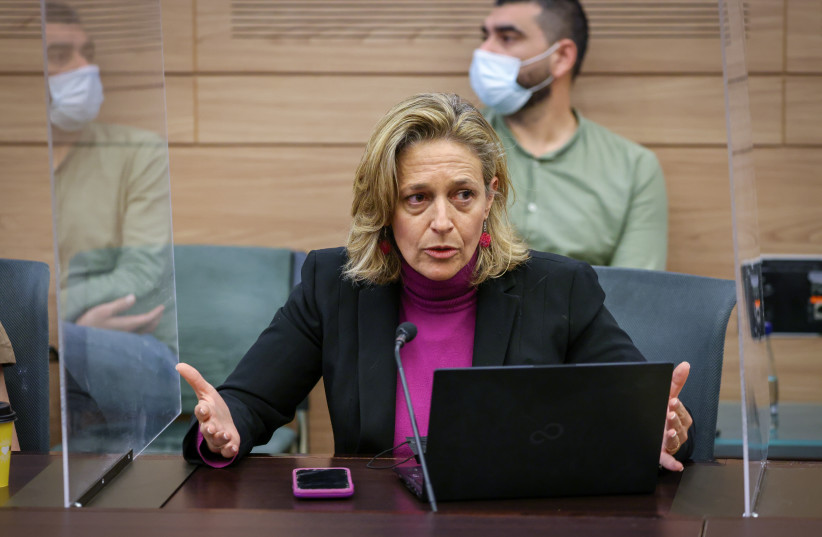The recent outbreak of polio cases in Israel has been caused by a lack of vaccination against the disease, Head of Public Health Services Dr. Sharon Alroy-Preis told a Knesset Health Committee meeting on Sunday.
Eight children have been diagnosed with polio in the country since a four-year-old in the Jerusalem area was discovered to have symptoms on March 8. Since then, the Health Ministry has launched an extensive operation to detect new cases and bring up rates of vaccination in communities and areas where they are low.
During a Sunday Health Committee meeting led by MK Idit Silman, Alroy-Preis offered insight into the challenges that health officials are facing in trying to contain any potential outbreak of the disease.
“It is a challenge for several reasons,” she explained. “First, due to fake news, suddenly everything has a question mark over it. Even vaccines that we have had for years and that we’ve seen eliminate diseases, suddenly they are being questioned.”
The other key reason, she added, is that there is a lack of logistical planning due to frequent school closures endured by the education system over the last two years of the COVID-19 pandemic.

Children are able to receive their routine vaccinations in several places, including in school. Due to lockdowns and school closures implemented at various points throughout the coronavirus pandemic, many children fell behind on their routine vaccination schedule, falling through the cracks of the health system. But this is a secondary issue and can be resolved fairly easily, Alroy-Preis said.
The more pressing issue, she stressed, is that of people who choose not to vaccinate their children – whether for ideological reasons or simply because they find the system too difficult to navigate.
“The situation we are seeing in Jerusalem is not just a result of [closures during] COVID,” she said. “There are whole communities that choose not to vaccinate, for ideological reasons or technical reasons. They have too many children to bring to get vaccinated, or the schedule is too much to keep up with.”
Regarding this issue, Alroy-Preis said the Health Ministry is working on finding a solution that will simplify the process for families with multiple young children. Regarding those who choose not to vaccinate them for ideological reasons, she acknowledged that health officials must find a way to approach them, talk to them and educate them on the sensitive subject.
The majority of polio cases are asymptomatic, with only 10%-20% presenting with flu-like symptoms, and less than 1% of all cases resulting in paralysis, such as in the case of the four-year-old child from Jerusalem. This fact, Alroy-Preis stressed, means that “there are likely hundreds of children in the Jerusalem area walking around with the virus who do not know they have it,” making vaccination against the disease all the more important.
Health Ministry official Ilana Gans offered insight into the process of vaccination against the poliovirus.
“In Israel, we have offered vaccination against the poliovirus since the 1950s; it is one of the oldest vaccines we have in Israel, and it is administered in baby clinics and in schools,” she said at the meeting. “It is part of the routine vaccines we give to our children. The polio vaccine is split into four and given in the first year of life, as most cases of polio develop in children under the age of five.”
The polio vaccine is available in two different forms – the oral poliovirus vaccine (OPV), which contains a weakened form of the live virus, and the inactivated poliovirus vaccine (IPV) – both of which are routinely given in Israel. Between 2005 and 2013, Israel discontinued the administration of the live polio vaccine, deciding that it was no longer necessary.
However, an outbreak of wild poliovirus type 1 (WPV1) in the South in 2013 caused this decision to be reversed, as once an outbreak has started, the only way to prevent it is to administer the live vaccine, as the inactivated version does not prevent transmission once it has already started spreading.
Subsequently, the oral polio vaccine was returned to the list of routine vaccines every child is expected to receive.
As a result of the polio case discovered on March 8, and any subsequent ones, the Health Ministry and healthcare organizations across the country have launched a public awareness campaign encouraging parents to vaccinate their children against the disease.
To date, all of the new polio cases have been detected in Jerusalem and the surrounding areas, but this does not mean that people outside of Jerusalem should not vaccinate their children if they have yet to do so, Gans said.
“We see that slowly, slowly it is spreading from Jerusalem to the rest of the country, and will eventually be present in all parts of Israel. We are not focusing solely on Jerusalem, we are working on a countrywide operation.”
However, Alroy-Preis added, “all of the children with symptoms that we have seen were unvaccinated, and were not even registered with a baby clinic…. if you know you have vaccinated your child you do not need to stress. Most parents do vaccinate their children, and we are just filling in the cracks.”
